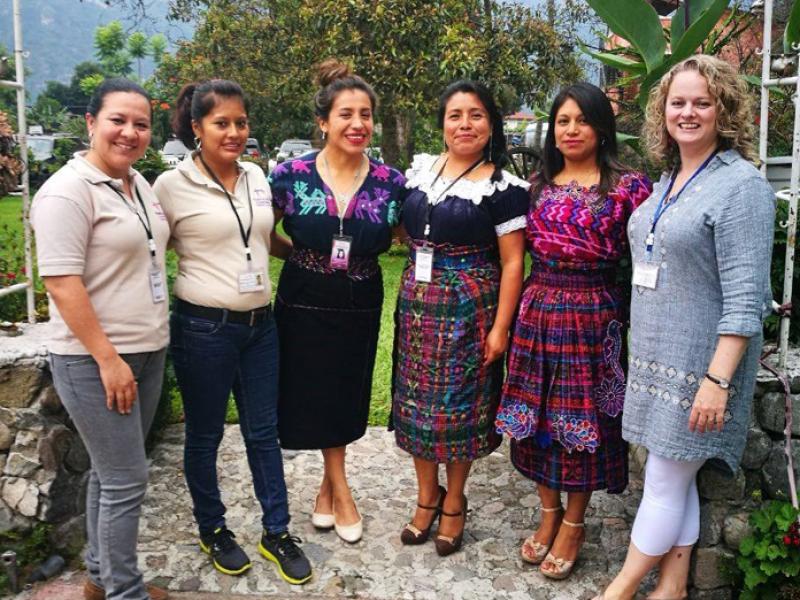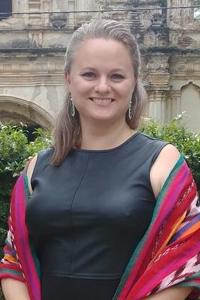Global citizen: Strategic visionary Caitlin Scott (MA ’11)

Caitlin Scott knows the inner workings of Friendship Bridge, starting from the ground up. That’s because over the past 20 years, she has held many positions there, from volunteer and intern to chief strategy officer.
Scott began volunteering at Friendship Bridge after graduating from high school in 2000. The organization, which serves 30,000 individuals annually, creates opportunities that empower Guatemalan women to build a better life. This mission was a perfect fit for Scott, who dreamed of a career in social justice or development, with a focus on Latin America.
With passion and a purpose, Scott attended the University of Colorado Denver, where she structured her undergraduate education to reflect her career goals. She created a “personal, self-defined program,” majoring in international affairs, minoring in Spanish and studying abroad in Spain and Mexico.
In 2005, Scott graduated with a bachelor’s degree, but putting her education and passion to work was no easy task.
“After getting my bachelor’s degree and living in Colorado, having grown up here, I didn’t really want to move too far away,” says Scott, who struggled to find a Colorado-based job in international development. What she wanted was to work for an organization like Friendship Bridge, and she was determined to make that happen.
Early in her career, Scott had applied for jobs at Friendship Bridge without success. Undeterred, she took the next step to achieve her goals: She began the master’s in international development program at the Josef Korbel School of International Studies.
“I felt that would help me get into the international development space,” she says. “It just so happened that while I was at DU, there was a [job] opportunity at Friendship Bridge.”
Scott accepted a position in 2009 as the administrative assistant in the U.S. office, where she supported the fundraising and governance part of the organization. This gave her insight into the needs of the organization, which informed some of her Korbel projects.
“I had the good fortune to structure some of my projects around what the organization needed, really diving deep into concepts that would really help [Friendship Bridge],” she says.
Microfinance proved to be one area of particular relevance. Friendship Bridge offers microcredit, or small loans, to impoverished women in Guatemala. These help them start or expand small businesses and create their own sustainable solutions to poverty. Scott applied for and was accepted to a two-quarter microfinance program through the Daniels College of Business in which they partner with Deutsche Bank. The bank employs the class to conduct a “due diligence evaluation” of one of the investees in their microfinance portfolio, Scott says.
Scott learned how to evaluate microfinance organizations, and then, as part of the program, she had the opportunity to evaluate not one but two organizations in Cambodia over spring break.
“That’s the kind of practical experience that I was really looking for with my education,” says Scott, who graduated in 2011 with a master’s in international development and a concentration in microfinance.
“I’ve always had a very clear idea of what I wanted,” she says. “I structured my education around what I wanted, and just was fortunate to find all those opportunities here in Denver.”
Over her years at Friendship Bridge, Scott has held positions in fundraising, development, project management and social performance management. Two years ago, she was named chief strategy officer, a position that means she is “involved in almost everything.” It’s a fitting role for someone who has worked her way up through the organization.
Scott’s perseverance has paid off in big ways. Last year, she was on a team that applied for and received a $1 million grant through a large, U.S.-based corporate foundation to develop a program that serves a specific segment of their clients.
“We’ve always closely evaluated what our clients’ preferences are, what their experiences are, and try to learn and implement new things to serve them better and increase our impact,” Scott explains. “And there’s a strategy that we had been developing based upon that feedback and what we’ve been seeing in the field, and that was we needed to differentiate our service for different segments of clients.”
While most clients create businesses to generate income for their families, some show ambition and entrepreneurial spirit to expand those businesses. Friendship Bridge started to formulate a program to develop that segment of clients who want to expand their businesses.
“We saw that we really needed to invest big in technology that would allow us to differentiate our service, invest in the types of entrepreneurial training and mentorship coaching acceleration services that this group would need,” Scott says, adding that such specialized service would be expensive.
When they discovered that the corporate foundation was expanding its scope of funding to international projects, Friendship Bridge jumped in. The foundation wanted to be involved in projects that contribute to community development and partner with organizations that like learning what works.
“There was a really great match opportunity there for us,” Scott notes. “We said, ‘Well, let’s go for it.’ They said, ‘OK, let’s do it. We want to learn with you.’”
Through this grant, Friendship Bridge is formalizing the design of the program and hopes to have 500 clients participating by the end of 2023.
With three or four trips to Guatemala each year, Scott has come to know many of her clients. She joins her team in the field as they interview clients and gets a sense of what’s happening on the ground. She also meets with a client committee, elected by regional clients, for quarterly focus groups or leadership training.
As a bonus, she takes her two children with her on these trips, and they see the passion she has for her job.
“I love that it’s not just a job. I have a passion for it. It inspires me, and I know that we’re achieving something,” she says.
This article was cross-posted on the Korbel School website courtesy of the University of Denver Magazine.



